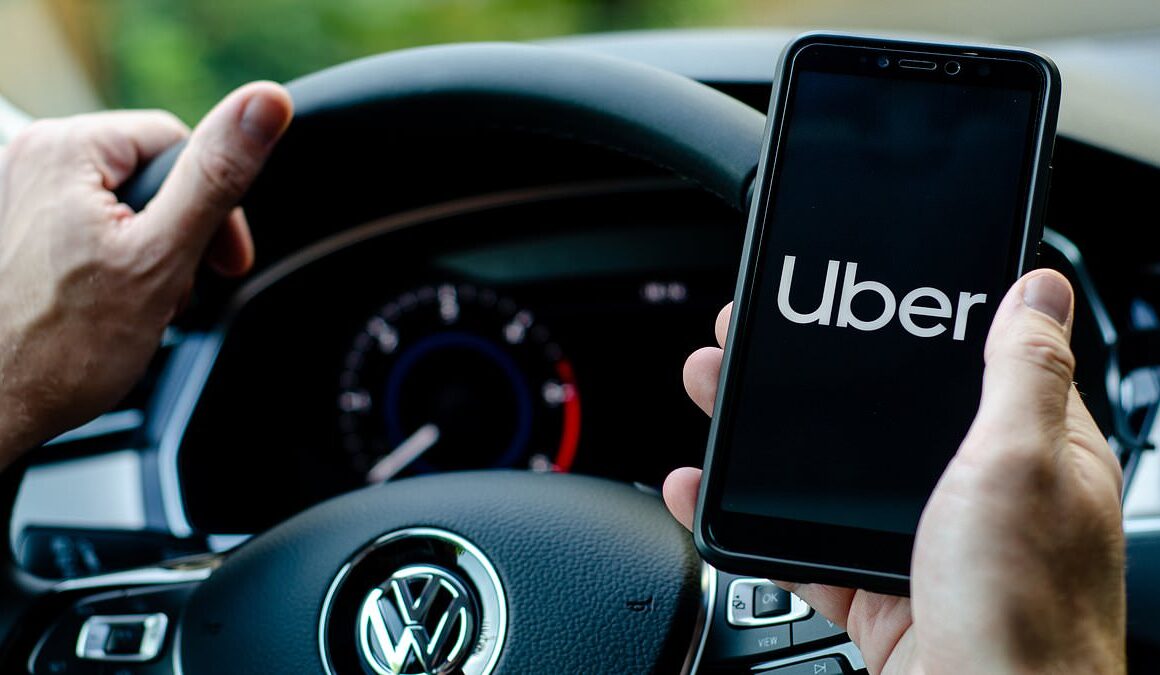Uber could driverless Chinese vehicles onto Britain’s roads as part of a bid to reduce greenhouse gas emissions.
The transport provider has announced ‘strategic partnership’ with Chinese car maker BYD aimed at bringing 100,000 new electric vehicles across the globe.
Both companies added they will also work together to deploy BYD’s self-driving vehicles onto the Uber platform, claiming the ride-hailing app is ‘well-positioned to bring autonomous vehicle technology to a global audience at scale’.
The multiyear partnership, which the companies described as the largest of its kind, will start in Europe and Latin America before expanding to Australia, Canada, New Zealand and countries across the Middle East.
Uber has already made a pledge that all of its vehicles in London will be electric by the end of next year, while it has vowed to achieve net zero emissions across the whole of the UK by 2030.

Uber is set to deploy thousands of driverless Chinese vehicles onto Britain’s roads as part of a bid to reduce greenhouse gas emissions

The transport provider has announced ‘strategic partnership’ with Chinese car maker BYD aimed at bringing 100,000 new electric vehicles across the globe. Pictured: The BYD Dolphin
High sticker prices for electric vehicles and increased borrowing costs have acted as barriers to EV adoption over the past two years, causing demand for such vehicles to grow at a slower-than-expected pace.
Escalating climate change concerns and the pressing need to cut greenhouse gas emissions have given a boost to the global push for electrification in the transportation sector.
‘By working together, the companies aim to bring down the total cost of EV ownership for Uber drivers, accelerating the uptake of EVs on the Uber platform globally, and introducing millions of riders to greener rides,’ the companies said in a statement.
Some 126,000 Uber drivers out of 7 million had zero emissions vehicles at the end of 2023. The company plans to accept only drivers with EVs in Europe and North America from 2030.
‘When an Uber driver makes the switch to an EV, they can deliver up to four times the emissions benefits compared to a regular motorist, simply because they are on the road more,’ Uber CEO Dara Khosrowshahi said.
‘Many riders also tell us their first experience with an EV is on an Uber trip, and we’re excited to help demonstrate the benefits of EVs to more people around the world,’ he added.

Uber CEO Dara Khosrowshahi (pictured) said Uber drivers ‘can deliver up to four times the emissions benefits’ of regular motorists when they switch to EV vehicles
‘Uber and BYD share a commitment to innovate towards a cleaner, greener world, and I am excited to work together towards that future,’ said Chuanfu Wang, Chairman and President of BYD.
Uber’s independent drivers will have access to advantageous financing or leasing offers for BYD’s electric vehicles, as well as discounts on recharging, maintenance and insurance.
BYD’s U.S rival Tesla is set to unveil its robotaxi product in October as it to looks to pivot after EV sales fell in the first two quarters of the year.
BYD surpassed Tesla last year as the world’s largest electric vehicle maker, though the Elon Musk-led EV maker has since regained the top spot.
BYD produces a number of EVs in different price segments, including a small hatchback that starts at under $10,000 in China, and is rapidly expanding the number of countries to where it exports and is planning to build factories in Europe.
The partnership with Uber could help BYD gain better brand recognition in new markets and boost sales for new dealerships.
Uber said in January it was working with Tesla to promote the use of EVs by its drivers in the U.S. as it aims to become emission-free in U.S. and Canadian cities by 2030.
The introduction of driverless cars in the US has been met with significant pushback with multiple vehicles having been repeatedly attacked, vandalised and immobilised in a sustained display of civic outrage in San Francisco.

A driverless Waymo Jaguar taxi was torched with fireworks by a mob of Chinese New Year revelers in San Francisco in February

The crowd used fireworks intended for the celebration to set the car ablaze
A driverless Waymo Jaguar taxi was torched with fireworks by a mob of Chinese New Year revelers in San Francisco in February.
The car became ‘confused’ as the fireworks stopped it dead in the road while the group of celebrators rallied around and destroyed the vehicle.
It was clearly no accident. Video footage shot by bystanders shows people scribbling graffiti on the car and breaking the windows before jumping on the bonnet and smashing the windscreen as the watching crowd applauded.
The Fire Department later released photos of the charred wreck: all that was left of a car estimated to have cost as much as £130,000.
Last year, residents of San Francisco also placed traffic cones onto the hoods of driverless cars, which causes the vehicle’s sensors to believe there is an obstacle ahead, causing the ride to stop.







